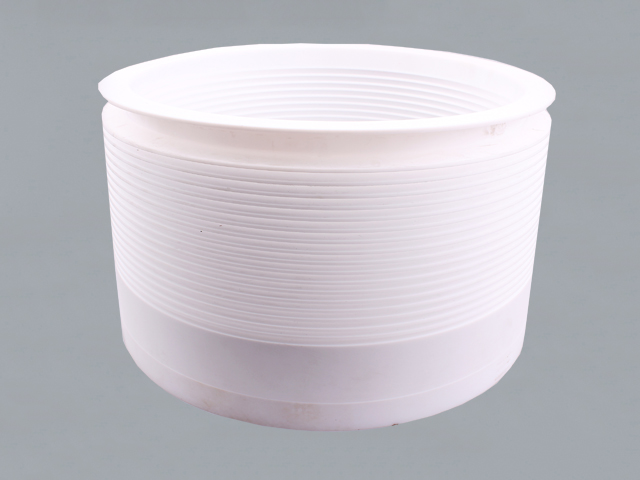Introduction to PTFE Bellows
PTFE Bellows, fully known as Polytetrafluoroethylene Bellows, are flexible pipes made from polytetrafluoroethylene (PTFE) material with a corrugated wall structure. They are high-performance sealing, insulating, and conveying components that combine the excellent chemical properties of PTFE with the mechanical advantages of the bellows structure.
The name directly reveals its core characteristics:
- Material: Polytetrafluoroethylene (PTFE), commonly known as "Teflon" or the "King of Plastics," providing top-tier chemical inertness and temperature resistance.
- Form: Bellows, a flexible tubular structure with transverse corrugations.
Key Characteristics
PTFE bellows perfectly inherit almost all the properties of PTFE and gain new capabilities due to the bellows structure:
1. Exceptional Corrosion Resistance: Resists almost all strong acids, strong alkalis, strong oxidizers, and organic solvents, including aqua regia. This is its core value.
2. High Flexibility and Compressibility: The bellows structure allows significant stretching and compression in the longitudinal direction and some degree of bending, enabling it to absorb displacement and compensate for misalignment.
3. Excellent High and Low-Temperature Resistance: Can be used continuously within a temperature range of -60°C to +260°C.
4. Non-stick and Hydrophobic Properties: The smooth inner wall prevents media adhesion and facilitates easy cleaning.
5. High Insulation: Excellent electrical insulation performance.
6. Long Service Life and Maintenance-Free: Due to the material's stability, it has an extremely long lifespan under correct usage and requires no maintenance.
Functions of the Bellows Structure
The design of the bellows is not just a morphological change but a functional leap:
- Compensate for Displacement: Can absorb axial, lateral, and angular displacement and deformation caused by thermal expansion, equipment vibration, or installation errors, protecting connected equipment or pipelines.
- Vibration Damping and Noise Reduction: The flexible bellows structure effectively isolates and reduces vibration transmission, lowering system noise.
- Enhanced Flexibility: Provides necessary flexible connections in complex pipeline systems, simplifying installation.
Manufacturing Processes
The production of PTFE bellows requires special processes, commonly including:
- Compression Molding and Sintering: This is the most mainstream and high-performance method. PTFE powder is filled into a special mold, pressed into shape, and sintered at high temperatures to form a complete bellows in one step. Bellows produced this way are dense, uniform, and have good pressure resistance.
- Machining (Turning): Processed from solid PTFE cylindrical blanks using a lathe. This method can produce large-sized products but has low material utilization, high cost, and potential internal stresses.
- Winding Molding: PTFE tapes or films are wound onto a mandrel and then sintered to set the shape. This method is suitable for large-diameter bellows.
Main Application Areas
Thanks to their unique properties, PTFE bellows are widely used in harsh environments:
- Chemical Industry:
- Transporting Corrosive Media: Used as flexible connecting pipes between pumps, valves, tanks, and reactors to convey various acids, alkalis, and organic solvents.
- Sealing: Used as auxiliary sealing components for mechanical seals to compensate for shaft movement and vibration. This is a classic and critical application.
- Semiconductor and Electronics Industry:
- Transporting ultra-pure chemicals without leaching ions to contaminate the media.
- Protecting the transmission of high-purity gases or liquids.
- Medical and Food Industries:
- Flexible connections in pharmaceutical and food production equipment, complying with hygiene standards.
- Laboratory Instruments:
- Components requiring corrosion resistance and flexibility in analytical instruments and experimental equipment.
- Power and Communication:
- Protecting cables or serving as insulating sleeves in highly corrosive environments.
Summary of Advantages
Advantages:
- Unparalleled chemical stability.
- Excellent flexibility and displacement compensation capability.
- Broad temperature application range.
- Non-stick, insulating, and long-lasting.
Comparison with Metal Bellows
| Property |
PTFE Bellows |
Metal Bellows |
| Corrosion Resistance |
Excellent |
Poor (requires materials like 316L, Hastelloy, significantly increasing cost) |
| Flexibility |
Excellent |
Good |
| Temperature Resistance |
Medium (-60°C ~ +260°C) |
Very High (depends on material, can exceed 1000°C) |
| Pressure Resistance |
Low to Medium |
Very High |
| Negative Pressure Resistance |
Poor |
Excellent |
| Cost |
Medium to High |
High to Very High (especially for corrosion-resistant alloys) |
| Primary Applications |
Sealing and flexible connections in highly corrosive environments |
High-temperature, high-pressure, high-vacuum environments |
PTFE Bellows are special pipe fittings designed to solve challenges in sealing, connection, and displacement compensation in highly corrosive environments.
- Core Value: They uniquely integrate PTFE's extreme corrosion resistance with the flexible functionality of bellows, making them irreplaceable key components in harsh chemical environments where metals and other plastics cannot perform.
- Typical Applications: They are ideal for mechanical seal systems in chemical pumps and valves, high-purity chemical delivery systems, and any application requiring corrosion-resistant flexible connections.


